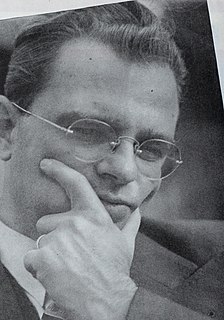Top 23 Quotes & Sayings by Joshua L. Liebman
Explore popular quotes and sayings by an American priest Joshua L. Liebman.
Last updated on April 20, 2025.
After a quarter of a century of personal experience and professional observation, I have come to understand that peace of mind is the true goal of the considered life. I know now that the sum of all other possessions does not necessarily add up to peace of mind; on the other hand, I have seen this inner tranquility flourish without the material supports of property or even the buttress of physical health. Peace of mind can transform a cottage into a spacious manor hall; the want of it can make a regal residence an imprisoning shell.
The quest for this unwearied peace is constant and universal. Probe deeply into the teaching of Buddha, Maimonides, or a Kempis, and you will discover that they base their diverse doctrines on the foundation of a large spiritual serenity. Analyze the prayers of troubled, overborne mankind of all creeds, in every age-and their petitions come down to the irreducible common denominators of daily bread and inward peace. Grown men do not pray for vain trifles. When they lift up their hearts and voices in the valley of tears they ask for strength and courage and understanding.
A love of neighbor manifests itself in the tolerance not only of opinions of others but, what is more important, of the essence and uniqueness of others, when we subscribe to that religious philosophy of life that insists that God has made each man and woman an individual sacred personality endowed with a specific temperament, created with differing needs, hungers, dreams. This is a variegated, pluralistic world where no two stars are the same and every snowflake has its own distinctive pattern. God apparently did not want a regimented world of sameness.
Maturity is achieved when a person accepts life as full of tension; when he does not torment himself with childish guilt feelings, but avoids tragic adult sins; when he postpones immediate pleasures for the sake of long-term values.... Our generation must be inspired to search for that maturity which will manifest itself in the qualities of tenacity, dependability, co-operativeness and the inner drive to work and sacrifice for a nobler future of mankind.
Excessive competitiveness, anxiety, hostility, suspiciousness, all originate in the nursery years. That is why, if we want a world of peace and not violence, love and not hate, cooperation and not murder, justice and not selfishness, we have to learn how to make childhood more happy. No nobler task could be pursued by our generation.
In this vast universe There is but one supreme truth- That God is our friend! By that truth meaning is given To the remote stars, the numberless centuries, The long and heroic struggle of mankind . . . O my Soul, dare to trust this truth! Dare to rest in God's kindly arms, Dare to look confidently into His face, Then launch thyself into life unafraid! Knowing thou art within my Father's house, That thou art surrounded by His love, Thou wilt become master of fear, Lord of Life, conqueror even of death!
The melody that the loved one played upon the piano of your life will never be played quite that way again, but we must not close the keyboard and allow the instrument to gather dust. We must seek out other artists of the spirit, new friends who gradually will help us to find the road to life again, who will walk the road with us.
The moment comes when the great nurse, death, takes a human, the child, by the hand and quietly says, "It is time to go home. Night is coming. It is your bedtime, child of earth. Come; you're tired. Lie down at last in the quiet nursery of nature and sleep. Sleep well. The day is gone. Stars shine in the canopy of eternity."






















